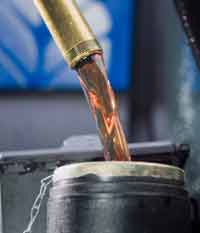Hedge your bets with fuel prices

Fuel price management, once the preserve of airlines and big haulage companies, is now available to farmers.
Clydesdale Bank recently introduced a hedging service for a minimum of 50,000 litres a month. “The main target is large arable businesses, contractors, and farms with additional haulage enterprises,” says Helen Jenkin, senior manager at the bank’s treasury solutions department.
However, it could also appeal to farm fuel suppliers, buying groups or smaller groups of farmers who want to build security into their diesel, oil or gas prices.
Timescales and volumes are flexible. “Some businesses might want a yearly contract, or even two to three years ahead. But we can also offer a mix of months, for example some might only need to hedge during the busy autumn period. That will open it up to a lot more people.” Where only selected months are used, the minimum volume rises significantly more.
Fixed forward price
If a farmer wants to hedge the diesel price for the next 12 months, Clydesdale will offer a fixed forward price for that period on the day the request is made. The farmer carries on buying physical fuel as and when needed, from any supplier.
Meanwhile the bank records a daily reference price for the commodity in question from specialist commodity information company Platts Market Data and converts this into a monthly average. “Let’s say the farmer took a price of 40p/litre from Clydesdale. If the Platts average goes to 45p/litre, then we would pay the 5p/litre differential every month to the farmer,” says Miss Jenkin.
“However, if the price falls to 37p/litre, then the farmer pays us 3p/litre. This smoothes out the monthly volatility.”
The Clydesdale scheme, which is also available to non customers, involves no-set-up or other fees and is designed solely as a risk management tool so should not be used to speculate on fuel that is not physically used, stresses Miss Jenkin.
However, farmers could make money by consistently buying the fuel they do use at a lower than the reference price. Conversely they continue to carry an element of risk because their physical diesel price may be higher than the reference price.
South western supplier Tincknell Fuels is putting together several groups of farmers to achieve the 50,000 litres a month minimum.
“The company will enter into the trade with Clydesdale and provide a fixed price plus delivery charge to a number of customers who individually would not meet the minimum use requirements,” says Craig Rose, Tincknells’ sales manager. “It makes a lot of sense, and we hope to get it up and running soon.”
